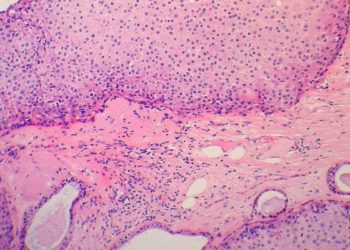High dose aflibercept reduced treatment burden in patients with diabetic macular edema
1. Aflibercept 8 mg was non-inferior to 2 mg for best-corrected visual acuity at 48 weeks.
2. Ocular adverse events were comparable across all intervention groups.
Evidence Rating Level: 1 (Excellent)
Study Rundown: Diabetic macular oedema (DMO) leads to vision loss in 5% of patients with diabetes. Anti-vascular endothelial growth factor (anti-VEGF) medications, such as aflibercept, help to resolve fluid accumulation in the macula and may improve visual acuity. However, there is little consensus around the optimal dose of aflibercept. This randomized controlled trial aimed to evaluate the safety and efficacy of high dose aflibercept (8 mg) versus standard dose (2 mg) in patients with DMO. The primary outcome of this study was a change in best-corrected visual acuity (BCVA) at week 48, while a key secondary outcome was the proportion of patients experiencing ocular adverse events. According to study results, high-dose aflibercept demonstrated non-inferiority in BCVA gains compared to standard dose. Although this study was well done, it was limited by the relatively short duration of follow-up.
Click to read the study in The Lancet
Relevant Reading: Aflibercept Monotherapy or Bevacizumab First for Diabetic Macular Edema
In-depth [randomized-controlled trial]: Between Jun 29, 2020, and Jun 28, 2021, 970 patients were screened for eligibility across 138 hospitals and retina clinics in 7 countries. Included were patients ≥ 18 years old with type 1 or type 2 diabetes and a known diagnosis of DMO. Eligible patients were randomly assigned to receive aflibercept 8 mg every 12 weeks (8q12), aflibercept 8 mg every 16 weeks (8q16), or aflibercept 2 mg every 8 weeks (2q8). Altogether, 658 patients (328 in 8q12, 163 in 8q16, and 167 in 2q8) were included in the final analysis. The primary outcome of change in BCVA from baseline to week 48 was non-inferior in aflibercept 8q12 and 8q16 versus aflibercept 2q8 (BCVA mean change 8.8 letters in 8q12, 7.9 letters in 8q16, and 9.2 letters in 2q8; difference in least squares mean was -0.57 letters, p<0.001 between aflibercept 8q12 and 2q8 and -1.44 letters, p=0.003 between aflibercept 8q16 and 2q8). The secondary outcome of ocular adverse events was similar across groups (32% in 8q12, 29% in 8q16, and 28% in 2q8). Findings from this study suggest that aflibercept 8 mg with extended dosing intervals could decrease treatment burden in patients with DMO.
Image: PD
©2024 2 Minute Medicine, Inc. All rights reserved. No works may be reproduced without expressed written consent from 2 Minute Medicine, Inc. Inquire about licensing here. No article should be construed as medical advice and is not intended as such by the authors or by 2 Minute Medicine, Inc.







